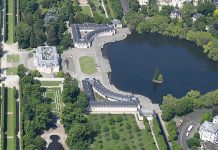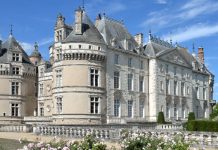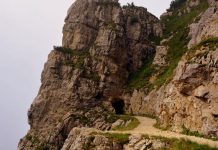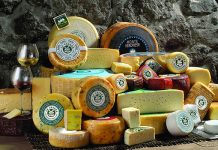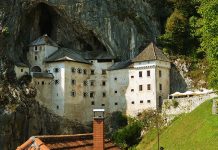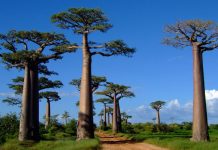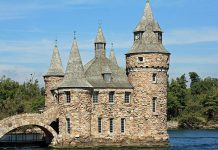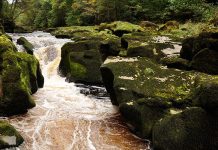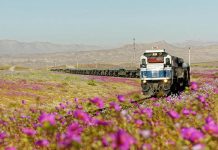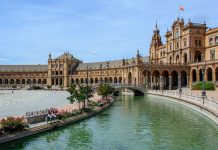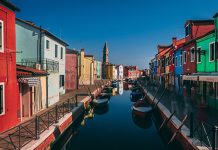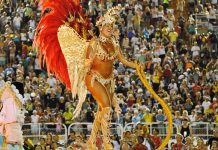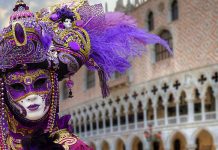Since ancient times all the kings lived in luxurious residences. The King of Thailand, Rama I (Phra Buddha Yodfa Chulalok) wasn’t an exception. In the second half of the XVIII century the capital of Thailand was transferred from Siam to Bangkok. No doubt, a new capital needed a new royal residence, striking with its splendor. Having been built more than two hundred years ago, the Grand Palace in Bangkok still amazes with its grandeur and luxury. It is still used by the royal family. It hosts annual royal ceremonies, as well as royal weddings, funerals and state receptions. An impressive architectural ensemble is located in the old town on the Rattanakosin island.

Photo: Mda from the Thai Wikipedia, via Wikimedia Commons (CC BY-SA 3.0)

Photo: By Andy Marchand, from Wikimedia Commons (CC BY-SA 3.0)

Photo: François Philipp/flickr (CC BY 2.0)
Construction of the palace was completed in 1785. It consisted of several wooden buildings, surrounded by a powerful protective wall 1900 meters long. Little by little, wooden structures were replaced with stone buildings, new stunning buildings were built.

Photo: Greg Knapp/flickr (CC BY 2.0)

Photo: By Caspar, from Wikimedia Commons (CC BY-SA 2.5)

Photo: Ninara/flickr (CC BY 2.0)
The king decided to build the Temple of the Emerald Buddha (Wat Phra Kaew), designed for his personal worship to the Buddha. This is one of the most revered Buddhist shrines.

Photo: By The original uploader was MichaelJanich at English Wikipedia (Transferred from en.wikipedia to Commons.), via Wikimedia Commons (CC-BY-SA-3.0)

Photo: Ninara/flickr (CC BY 2.0)

Photo: By D.Alyoshin, from Wikimedia Commons (CC-BY-SA-3.0)
Emerald Buddha is a small statue about 70 cm high. It represents a Buddha sitting on a golden throne. According to the legend, the statue was discovered by the monks in 1434 in a stupa, which was destroyed by a lightning strike.

Photo: By JPSwimmer (Photographed on location in Bangkok, Thailand), via Wikimedia Commons (CC BY-SA 3.0)
In addition to the Temple of the Emerald Buddha, there are several unique sights on the territory of the complex.

Photo: pxhere.com (CC0 Public Domain)

Photo: By The original uploader was MichaelJanich at English Wikipedia (Transferred from en.wikipedia to Commons.), via Wikimedia Commons (CC-BY-SA-3.0)
Among them are the golden-plated stupa-shaped building Phra Si Rattana Chedi, where relics of Buddhism are kept. It is believed that in this stupa a fragment of the bone of the Enlightened is kept.

Photo: By The original uploader was MichaelJanich at English Wikipedia (Transferred from en.wikipedia to Commons.), via Wikimedia Commons (CC-BY-SA-3.0)

Photo: By Phillip Maiwald (Nikopol), from Wikimedia Commons (CC BY-SA 3.0)

Photo: By Adam Jones, via Wikimedia Commons (CC BY-SA 2.0)
The library of sacred Buddhist manuscripts Phra Mondop, decorated with gold and precious stones. It features a unique collection of manuscripts on palm leaves.

Photo: Ian Gratton/flickr (CC BY 2.0)

Photo: By Wachararwish, from Wikimedia Commons (CC BY-SA 3.0)

Photo: Diego Delso, from Wikimedia Commons (CC BY-SA 3.0)
The royal pantheon of Prasat Phra Thep Bidon is magnificent as well. Here the sculptures of the kings of the Chakri dynasty are installed.

Photo: publicdomainpictures.net (CC0 Public Domain)
Despite this, the Palace is opened for public. Tourists from all over the world like to visit it. But be sure to mind your look: shorts, tight-fitting clothes and decollete are prohibited. The shoes should also be closed.

Photo: By Dennis Jarvis (https://www.flickr.com/photos/archer10/3674615313), via Wikimedia Commons (CC BY-SA 2.0)

Photo: Diego Delso, from Wikimedia Commons (CC BY-SA 3.0)

Photo: pixabay.com (CC0 Creative Commons)

Photo: By Simon Steinberger from Germany (http://pixabay.com/p-424/?no_redirect), via Wikimedia Commons (CC0)

Photo: VasenkaPhotography/flickr (CC BY 2.0)

Photo: Ninara/flickr (CC BY 2.0)


